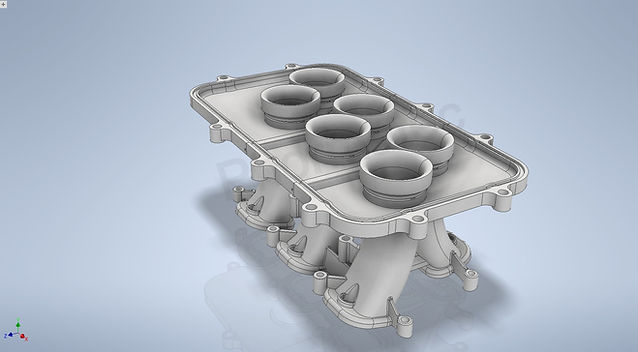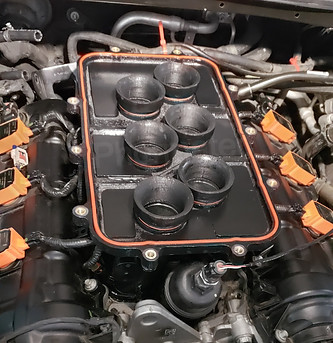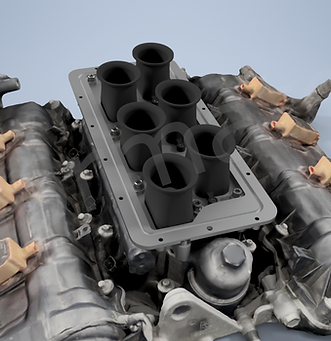Pentastar High-Flow Intake Manifold
Development of the first aftermarket intake manifold for the Pentastar engine!


- August 29, 2020
These are the first concept models of the manifold that were created, in order to gauge community response for the idea. This was a purely conceptual model of the manifold, with a dual plane design and nearly no accurate dimensions.


- October 22, 2020
After continued community support of the idea, a first prototype was drafted and produced. This first prototype settled on a "high-rise" design that replaced both the stock lower and upper intake manifolds. It was only meant as a test piece to verify dimensional accuracy of critical areas in the 3D model, and was not functional.


- February 22, 2021
Depicted here is the completed 3D model of the semi-functional second prototype; as well as, eventually, the first fully functional prototype. This model was designed in many separate sections that were meant to be 3D printed and assembled. Bolts, heat-set threaded inserts, various gaskets, and reinforced epoxies were used to complete the constructions of both the second and third prototypes.

- March 8, 2021
This is the second, semi-functional, prototype. It was 3D printed (from the model above), using a Polylactide polymer and was given a rubberized coating with custom gaskets to ensure it was airtight. The engine was able to start and idle, however, the polymer used was not structurally able to withstand full operating vacuum pressures and temperatures.


- September 20, 2021
Here is the third, fully-functional prototype. Again, it was 3D printed (from the same model as before), but now using a Polyamide 6 polymer with carbon fiber reinforcement. Custom gaskets and structural aluminum supports were created as well. This polymer, combined with the structural supports, was able to withstand all of the various operating conditions of the engine. The goal will be to establish a proof of concept and show any gain, or loss, the engine may make.


- September 26, 2022
Shown are data log comparisons between a stock intake manifold (top) and the third prototype (bottom) at similar operating conditions. The test vehicle was driven for 30 minutes with the stock intake manifold, then on the same day without any changes, the third prototype was installed and the test vehicle was driven for another 30 minutes. Data was logged throughout with multiple wide open throttle pulls. Then, all of the data was analyzed for engine gains, losses, or any other changes in general. At the shown moment in both logs the engine is at WOT, at about 7100 RPM, near the same ECT, and with identical FA enrichment and spark timing. An increase in aircharge of 3.9mg and 6 Nm of trans engine torque was seen with the prototype manifold. Furthermore, while this method is not always accurate, the RWHP calculated utilizing torque PID's within the data logger showed an average increase of 3.16 RWHP across all driving conditions and an average increase of 6.64 RWHP on wide open throttle pulls. While these gains are not exactly significant, they were enough to establish a proof of concept and allow the project to be developed further.


- August 23, 2022
Depicted here is a render of the next design. There have been significant changes to the overall design but the main concept remains. The plenum chamber will be secured to a factory upgraded lower intake manifold. Theoretically this should yield the same benefits as the previous design, but will be far easier to manufacture. The throttle body has also been relocated to a position over the oil filter cap, fully exposing both banks of the engine. The MAP sensor and vacuum ports will be located at the rear of the manifold.